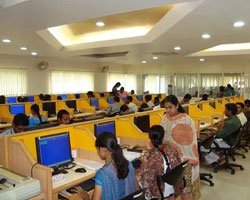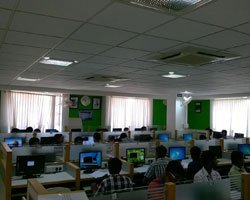B.E. Computer Science and Design is a 4 years degree programme started in the year 2022-23 with intake of 30 students. Aims to develop graduates with computing tools and technologies, along with the interactive design approaches and its technologies.
In today's world, web applications and products are designed to be highly interactive, engaging users across various business sectors. The growing focus on user experience has significantly elevated the importance of Interaction Design and Design Methods within the IT industry.
The B.E. Computer Science and Design program is tailored to equip graduates with essential computing tools and technologies, alongside modern interactive design techniques. This program aims to prepare students for roles not only in the IT industry but also in design fields such as Virtual/Augmented Reality, gaming, IoT, and more, which enhance our control over our surroundings. For software development companies, applying effective interaction design principles and techniques is crucial. Additionally, the program supports students interested in further studies or entrepreneurial paths in the Computer Science field.










To produce professionals for designing technology with ethical values, ingenious attitude and team sprit required for the continual development of the society and the nation.
The graduates of the programme will be able to
PEO1: To develop the ability to think critically, analyse and make innovative design for offering techno-commercially feasible solutions.
PEO2: To apply current tools and technologies to contribute for industries, public sectors, research organization for solving time critical problems.
PEO3: To impart the knowledge of inventive design skills and lifelong learning to succeed in their professional challenges
Engineering Graduates will be able to:
PO1: Apply knowledge of mathematics, natural science, computing, engineering fundamentals and an engineering specialization as specified in WK1 to WK4 respectively to develop to the solution of complex engineering problems.
PO2: Identify, formulate, review research literature and analyze complex engineering problems reaching substantiated conclusions with consideration for sustainable development. (WK1 to WK4)
PO3: Design creative solutions for complex engineering problems and design/develop systems/components/processes to meet identified needs with consideration for the public health and safety, whole-life cost, net zero carbon, culture, society and environment as required. (WK5)
PO4: Conduct investigations of complex engineering problems using research-based knowledge including design of experiments, modelling, analysis & interpretation of data to provide valid conclusions. (WK8).
PO5: Create, select and apply appropriate techniques, resources and modern engineering & IT tools, including prediction and modelling recognizing their limitations to solve complex engineering problems. (WK2 and WK6)
PO6: Analyze and evaluate societal and environmental aspects while solving complex engineering problems for its impact on sustainability with reference to economy, health, safety, legal framework, culture and environment. (WK1, WK5, and WK7).
PO7: Apply ethical principles and commit to professional ethics, human values, diversity and inclusion; adhere to national & international laws. (WK9)
PO8: Function effectively as an individual, and as a member or leader in diverse/multi-disciplinary teams.
PO9: Communicate effectively and inclusively within the engineering community and society at large, such as being able to comprehend and write effective reports and design documentation, make effective presentations considering cultural, language, and learning differences.
PO10: Apply knowledge and understanding of engineering management principles and economic decision-making and apply these to one’s own work, as a member and leader in a team, and to manage projects and in multidisciplinary environments.
PO11: Recognize the need for, and have the preparation and ability for i) independent and life-long learning ii) adaptability to new and emerging technologies and iii) critical thinking in the broadest context of technological change. (WK8)
PSO1: Acquire knowledge in several areas of Computer Science and Design to promote skills necessary for a profession, entrepreneurship and higher education.
PSO2: Ability to use appropriate tools and platforms successfully, as well as improve them, to produce applications/products for new media design in areas likes multimedia, animation, virtual reality and gaming.
B.E- Computer Science and Design



Research work is a important part of every department at K.S.R. College of Engineering. Here’s the roundup of the research work – publications, patents, Grants and programs organized by the department.
Each department has connections with relevant industry professionals, tie-ups through MOUs with companies in order to facilitate Internships, Industry visits, Projects, Knowledge Sharing Expert Sessions by industry experts. This greatly helps us to bring in the industry-perspective into the courses being taught and a hands-on learning for the students.
Phone : 9080819959
Email : hodcsd@ksrce.ac.in
Phone : 9842680244
Email : gopinathcse@ksrce.ac.in